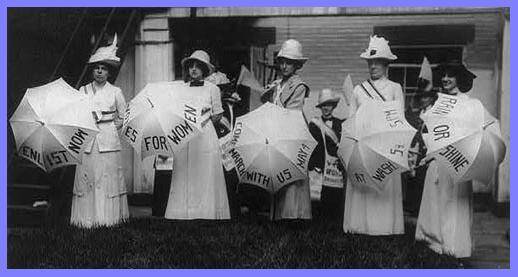Barred from the voting booth, 19th-century American women perfected the art of door-to-door campaigning, writes Harvard professor Daniel Carpenter on the Monkey Cage blog. In particular, women took the lead in collecting signatures for anti-slavery petitions before the Civil War. Congress refused to act on the petitions, but they were just the beginning of a long tradition of activism by women, eventually leading to women’s suffrage (and also the temporary prohibition of alcohol, but nobody’s right all the time).
What we now call grass-roots politics consists of mailing lists, automated phone calls, and Facebook pages, along with people paid to wheedle signatures at shopping centers. In the pre–Civil War era, Carpenter writes, “women had to walk petitions; one petitioner wrote that she walked 21 miles a week in canvassing. … Persuading other men and women to sign meant long conversations and often rejection, possibly the threat of violence (even in the North, anti-slavery was not a popular stance in the 1830s).”
Carpenter continues, “all of this activity brought newly mobilized women into close contact with others who thought like them, allowing networks to form and consciousness to emerge.” He holds out hope that “person-to-person canvassing” can still be relevant in American politics, which may be optimistic given how many of us now feel about the unexpected knock on a front door.
Earlier this month, Seth Masket of the Mischiefs of Faction blog also wrote about women pioneers in grass-roots politics, but he covers a period more than 100 years after the anti-slavery petitions.
Masket reports on a theory that “housewives” took on a bigger role in politics after World War II, when reform measures weakened the power of urban party machines: "With rapidly rising incomes and the advent of labor saving household appliances, suddenly many housewives found themselves with leisure time, a novel concept for the middle class. This era saw the rise of many new associational activities, including social clubs, bowling leagues, and campaign volunteerism. Indeed, women played very prominent roles in political campaigns in the 1950s and ’60s."
But this influence has long been on the decline, an inevitable occurrence as women entered the workforce. Masket cites data showing that housewives made up 40 percent of campaign volunteers in the mid 1950s but are now down to about 10 percent, with “more ideologically motivated men” taking over. (Presumably, many are getting paid for what women used to do for free.) Masket calls for more research on the theory that this shift is partly responsible for our now-polarized political climate. Perhaps former “Goldwater Girl” Hillary Clinton and other young women who worked for the rather polarized presidential candidates of the 1960s can shed some light on this.
Image from the National Women's History Museum.








